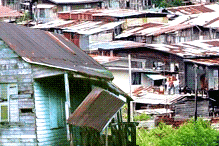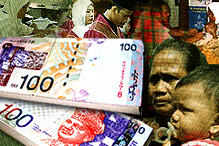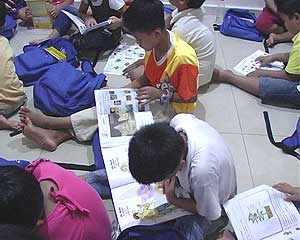comment Malaysia may have been spared the worst effects of the economic slowdown due largely to its oil and gas reserves and other natural resources.
But years of spending - some say squandering - of the oil revenues on prestige projects and bailouts could have gone into strengthening the social safety nets.
The government's provision of universal benefits, notably free education and health care, as well as subsidies on a number of essential commodities, have been able to ensure that most children and poor families do not fall through the gaps, said Eva Jenkner, the deputy representative to the United Nations Children's Fund (Unicef) Malaysia and a senior economic social policy specialist.
"But concerns remain with regard to the comprehensiveness of the social safety nets, with only limited coverage rates of programmes specifically targeted at poor families and children, and many particularly vulnerable children out of reach of school-based social interventions (such as school feeding programmes)," she told IPS in email interview.
 As coordinator of the Oppressed People's Network (known by its Malay acronym, Jerit), Rani Rasiah is familiar with the plight of communities living on the margins of development, particularly the children.
As coordinator of the Oppressed People's Network (known by its Malay acronym, Jerit), Rani Rasiah is familiar with the plight of communities living on the margins of development, particularly the children.
In September 2008, as signs of an economic slowdown emerged, she carried out an informal survey among urban settler (squatter) communities around Ipoh.
"I found that in terms of food, children in these communities, were really affected. They were deprived of milk powder. Young children would be having black coffee for breakfast and there was no milk in their diet, no emphasis on a balanced diet.''
Unemployment crept up from 3.1 percent in the fourth quarter of 2008 to reach 4.0 percent in the first quarter of 2009 before tapering off to 3.6 percent in the second quarter.
The figure swelled from 351,000 in the last quarter of 2008 to 451,000 in the first quarter of 2009 as manufacturing firms, faced with falling orders, shed jobs.
Quite apart from the actual job losses, it was the loss in overtime pay that hurt many families, observed Rani.
"I found that low-income families, not necessarily the hardcore poor, were finding it increasingly difficult to make ends meet."
These households might have two adults working typically as municipal council workers or factory workers, and they may own a motorbike. Before the slowdown, basic salaries would usually be around RM400-500. With overtime pay, take-home wages could reach RM1,000.
"As long as the economy was doing all right, they were fine," said Rani.
Feeling the pinch
When firms began slashing overtime and reducing the number of days worked, households suffered. Many had taken loans, whether from banks or moneylenders, on the strength of overtime-boosted income, and were unable to service these; others found their homes being foreclosed.
"If they have children, their situation is worse. Some of them had to stop their children from going to school because they can't afford bus fare, which has really gone up. If they have three or four children going to school, bus fares (at around RM40 monthly per child) can take up a big chunk of their incomes."
Rani said the government should subsidise school buses across the board and set up an easy loan scheme with low interest, similar to what civil servants are entitled.
"The government has spent billions of ringgit to save the corporate sector, but there's nothing much for the poor," she said.
To reduce the national fiscal deficit from 7.4 percent to 5.6 percent, the 2010 budget envisages drastic cuts in operational expenditure by 13.7 percent and development expenditure by 4.5 percent.
 Jenkner said it is important to more effectively target social expenditure and closely monitor household real incomes, social indicators and outcomes.
Jenkner said it is important to more effectively target social expenditure and closely monitor household real incomes, social indicators and outcomes.
This would ensure that households do not resort to short- term coping mechanisms, such as taking children out of school, reducing their nutritional intake or deferring health visits, all of which could have adverse long-term effects on children.
This, she added, has been a central lesson of most crises, such as the 1997 East Asian financial debacle.
Donations down
NGOs, meanwhile, are struggling to meet the needs of the children who do fall through the gaps in the social safety nets. Homes for children from broken and disadvantaged families, and skills training centres for juveniles, have experienced a sharp fall in donations.
Public donations have gone done by 20-30 percent, said Robin Devasagayam, director of the Monfort Youth Centre in Malacca, a residential care centre that provides training to 83 teenage boys in skills such as motor mechanics.
The renowned centre run by a Catholic group, has expansion plans for a new double-storey building for language and computer maintenance. In the past, the group relied on donations from the public and companies to fund its work.
"This time there have been few replies to our appeals. We have raised funds to put up the building, but we don't have enough funds to furnish it," said Devasagayam.
Other children's homes are badly affected as well.
"Most of the companies have held back their year-end community service projects, and everyone is trying to protect their own interest first," said S Joseph, who runs a home for orphans and children of very poor single mothers on mainland Penang.
"Many of the cases I now encounter are due to parents being unable to provide for their children's basic needs such as education because of financial difficulties. But I can't take in all these children, as I have to provide for those already here.”
Donations to the home have dropped by an average of 50 percent, and “there have been months I have gone through with zero donations".
 Even finding volunteers to look into the needs of poor children, including those belonging to refugee families, is proving to be difficult, said Fintan Ooi, a coordinator at a learning centre run by a NGO.
Even finding volunteers to look into the needs of poor children, including those belonging to refugee families, is proving to be difficult, said Fintan Ooi, a coordinator at a learning centre run by a NGO.
"In normal economic times, ordinary people could be called upon to help these children with their studies or to donate or 'adopt them' in terms of contributing financially to their educational and other needs," Ooi said.
"But in these slow economic times, even these volunteers themselves are more preoccupied with their own families' economic problems."
(This feature was produced by IPS Asia-Pacific under a series on the impact of the global economic crisis on children and young people, in partnership with Unicef East Asia and the Pacific.)
- IPS

